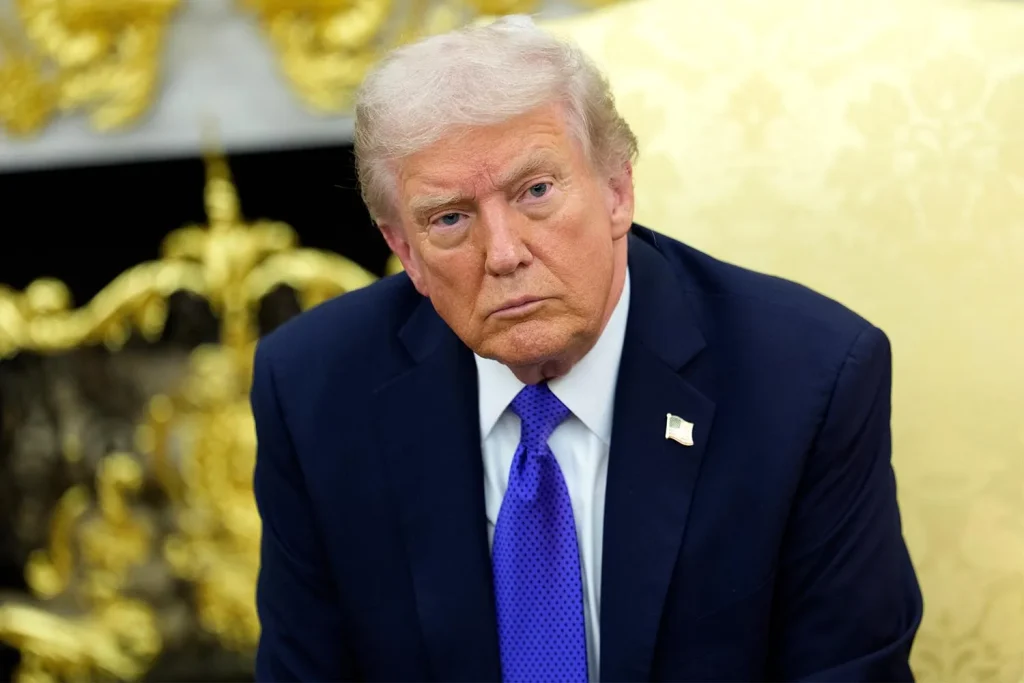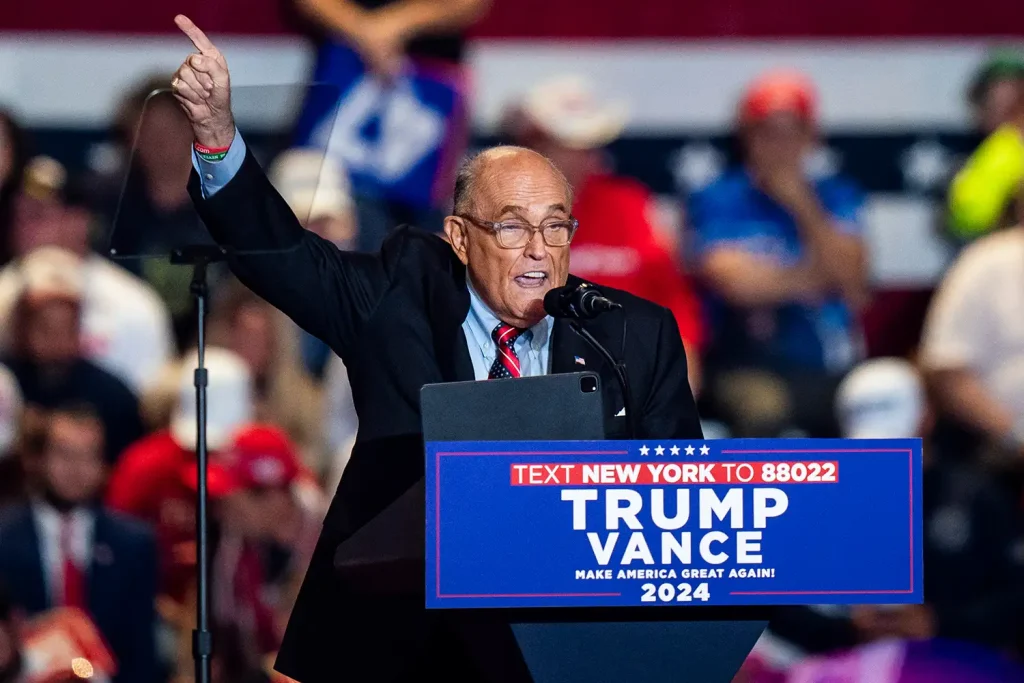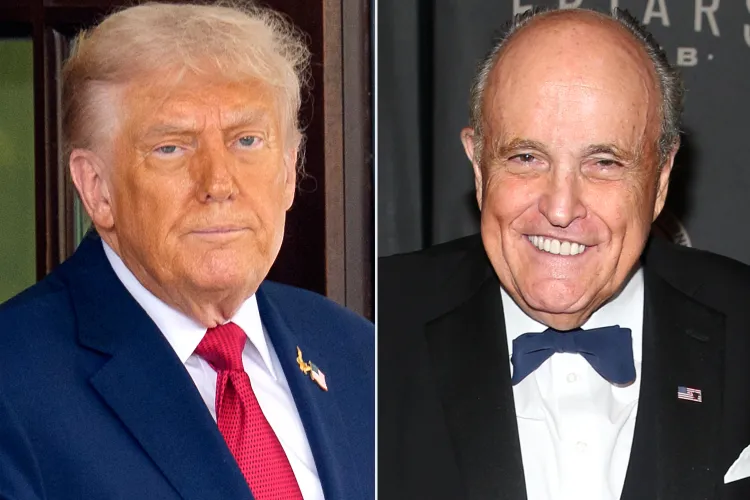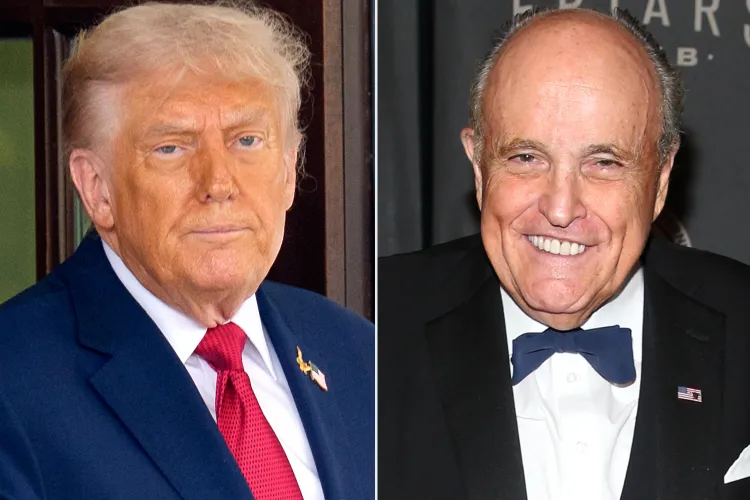Donald Trump Grants Full Pardons to Rudy Giuliani and More Than 70 Allies Tied to 2020 Election Efforts — A Historic and Controversial Move That Rewrites the Post-Election Legacy
President Donald Trump on November 7, 2025, issued a sweeping proclamation granting a full, complete, and unconditional pardon to Rudy Giuliani and more than seventy others who supported his administration’s post-2020 election efforts to overturn the results. According to official statements and major media reports, the action covers conduct related to advising, organising, executing, or backing alternative slates of presidential electors and other efforts to challenge the 2020 presidential election results.

The pardon list includes several high-profile names familiar to anyone who followed the aftermath of the 2020 election: attorneys Sidney Powell and John Eastman, campaign adviser Boris Epshteyn, former White House chief of staff Mark Meadows, and Giuliani himself. The announcement was made through a late-evening White House release and a social-media statement, describing the pardons as a move to “end a grave national injustice perpetrated upon the American people following the 2020 Presidential Election” and to promote what Trump called “a process of national reconciliation.”
Giuliani, the former mayor of New York City and Trump’s personal attorney during the election challenge, has faced years of legal and financial turmoil for his actions after 2020. He was disbarred in both Washington, D.C., and New York for his role in spreading unverified election claims, and was ordered by a federal jury to pay nearly $150 million to two Georgia poll workers he defamed while promoting conspiracy theories about ballot fraud. For him, the pardon is more than a legal document—it is a lifeline. In his first comments following the announcement, Giuliani said he was “surprised and grateful,” adding that the decision “vindicated years of public persecution for doing what [he] believed was his patriotic duty.”

While the pardon shields Giuliani and the others from potential federal prosecution, it cannot erase the numerous state-level investigations that continue to unfold. Prosecutors in Georgia, Arizona, Michigan, and Nevada are still pursuing criminal cases connected to alternate elector schemes and election-interference efforts. Because the presidential pardon applies only to federal crimes, those proceedings remain active. Legal experts have emphasised that Trump’s clemency move, while symbolically sweeping, may not substantially affect the trajectory of these ongoing state cases.
Still, politically and symbolically, the move is monumental. For Trump’s allies and supporters, the pardons represent justice delayed but not denied—an effort to correct what they describe as politically motivated prosecutions. In an official White House statement, Press Secretary Karoline Leavitt said, “These great Americans were persecuted and put through hell by the Biden Administration for challenging an election, which is the cornerstone of democracy.” Trump’s supporters online echoed the sentiment, hailing the pardons as an act of loyalty and courage.
Critics, however, view the mass clemency as a dangerous precedent—an effort to rewrite history and blur the line between accountability and retribution. Legal scholars have pointed out that Trump’s move may redefine the boundaries of presidential power, as this marks the first instance of a president pardoning individuals involved in attempts to overturn an election he personally lost. Democratic lawmakers and watchdog groups quickly condemned the action, calling it a “political pardon spree” that undermines the rule of law.

The implications go far beyond politics. The 2020 election, which saw an unprecedented refusal to concede and culminated in the January 6 Capitol riot, remains one of the most divisive moments in modern American history. By extending pardons to those who helped fuel the legal and logistical challenges to that election, Trump is reframing the narrative—from one of wrongdoing to one of redemption. His message, both implicit and explicit, is that those who stood by him were not criminals but patriots.
For Giuliani, the pardon closes one chapter but opens another. Once celebrated as “America’s Mayor” after September 11, he later became one of the most polarising figures in American politics. His fall—from federal prosecutor and New York icon to embattled lawyer facing disbarment, lawsuits, and bankruptcy—has been one of the most dramatic arcs of the Trump era. The pardon now restores his standing among Trump’s base, even if it cannot undo the professional consequences that followed his post-election crusade.
For Trump himself, this act is part of a broader effort to consolidate loyalty and reassert his narrative of victimhood and vindication. By granting clemency to his allies, he is not only rewarding those who stood by him but also sending a clear signal to current and future supporters: loyalty will be remembered, and defiance will not be forgotten.
The move also underscores Trump’s enduring hold on the Republican Party. Despite years of investigations, court cases, and controversies, his influence within conservative circles remains unmatched. The pardons, seen by some analysts as politically strategic, come at a time when he faces continued criticism for his handling of election-related unrest but remains the dominant figure in GOP politics.
Legally, the breadth of the pardon is striking but not unprecedented in ambition. The language of “full, complete and unconditional” clemency mirrors phrases used in historical amnesties following national crises, such as President Andrew Johnson’s post-Civil War pardons and President Jimmy Carter’s 1977 pardon of Vietnam War draft evaders. But in this case, the controversy lies in the nature of the actions forgiven—activities directly tied to undermining a certified election result. That tension between reconciliation and accountability may shape legal scholarship and political debate for years to come.
Public reaction has been predictably split. Trump loyalists have celebrated the decision as an act of courage and leadership, while critics see it as a move that erases consequences for serious breaches of democratic norms. On social media, hashtags like #PardonGate and #TrumpClemency trended within hours. Editorial boards across major newspapers called the action “deeply irresponsible,” while conservative commentators described it as “the final correction of a political witch hunt.”
Giuliani, speaking briefly outside his Manhattan apartment, said he was looking forward to “finally moving on.” He insisted that his actions after the 2020 election were motivated by “belief in the Constitution,” and described the years since as “a nightmare that tested faith, loyalty, and justice.” For others on the pardon list, similar statements of vindication have emerged, painting themselves as victims of a politically charged justice system.
As the dust settles, one fact remains clear: Trump’s decision to pardon Rudy Giuliani and dozens of others will rank among the most consequential acts of clemency in modern history. It represents the culmination of a years-long battle over truth, power, and accountability that began on election night in November 2020 and has yet to fully end. Whether history views it as an act of reconciliation or revisionism will depend on who writes the next chapter.
For now, the headlines tell a familiar American story—of loyalty and loss, power and forgiveness, justice and politics colliding in one defining moment. And as always, Donald Trump stands at the centre of it all, wielding the pardon pen not just as a tool of mercy, but as a statement of enduring dominance.


